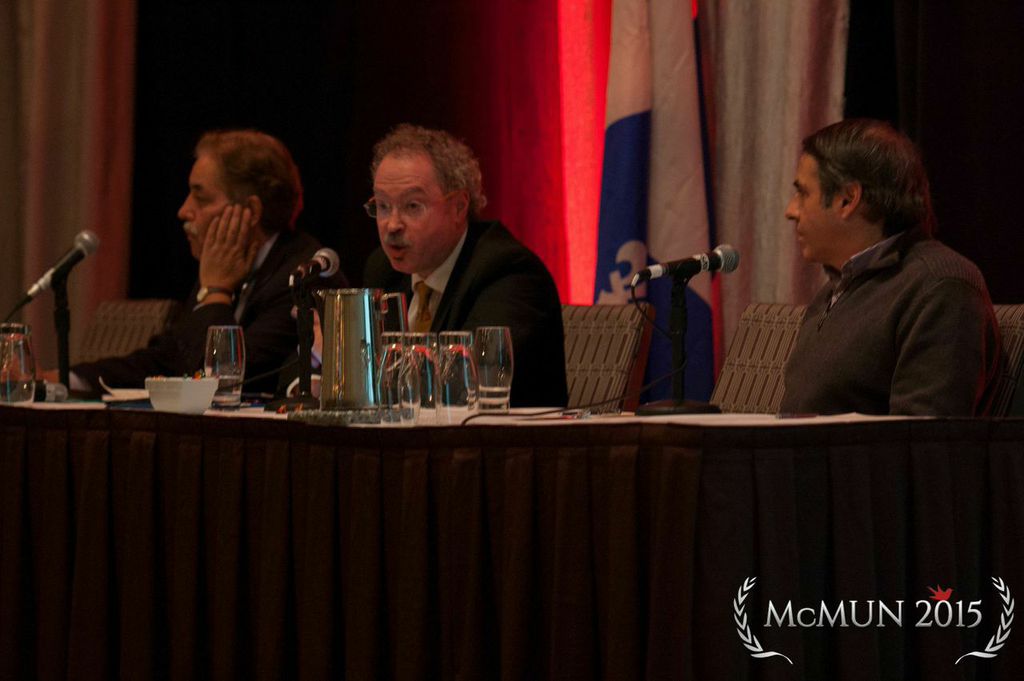GLF Interviews

May White-Vilmouth and Emma Noradounkian
After the Global Leadership Panel, we proceeded to having a quick interview with the speakers regarding their general impression of the panel’s discussion. This year’s panel included a range of academics and professionals. Mark Brawley, professor at McGill specializing in international political economy, acted as moderator for the night’s discussion. Also included in the discussion was Kenneth Lester, a McGill Professor teaching applied adjustments at the Desautels Faculty of Management. He is the founder of the health care personnel agency Alternacare. Mr. Lester is also the Chief Investment Officer at Desautels Capital Inc, a company managed by McGill’s Honours Investment Management students. The third panelist was Ajay Markanday, who works with the chief resource mobilization and operations support service at FAO (The UN’s Food and Agriculture Organization), and has recently been the representative of FAO in Cambodia. The final panelist was Christian Kastrop, who after working at the Federal Ministry of Finance in Berlin, became Director of the Policy Studies Branch at the Economics Department of the OECD. He is also a chairman of OECD senior budgetary officials and a lecturer at the University of Berlin.
The Global Leadership Panel was a vibrant discussion led by Professor Brawley, who tactfully directed and redirected the flow of the conversation. Incisive follow-ups and comments imbued with nuance created a dynamic and lively setting. Brawley highlighted that, as moderator to the panel, he wished to create an environment conducive to discussion amongst both panelists and attendees.
“Panel discussions (or even debates) tend to follow scripted lines — people may speak about their organization or institution many times a year, so they give the same speech they’ve given before,” He added that he sought to challenge the speakers “to raise important issues about how international organizations, evolve, how they cooperate, and what they do for us.”
Brawley also spoke about the importance of holding such panels, stating that the GLF offered contrasting views, topics of contention and agreement, and most importantly, an arena for discussing the future of financial international institutions.
Brawley then directly addressed the students. Students should use this opportunity to learn about the FAO, OECD, and other institutions, and particular attention should be paid to the ways in which they can improve.
“We perhaps could have done more to speak to career opportunities in the area, and we definitely could have gone more in-depth on ways to improve the functioning of international institutions,” he added.
When we spoke to Mr Lester, he expressed his interest in the promotion of events which entwine the social and academic realms. “I’m very impressed that students come from all over the world to attend this forum where they can learn from each other and network. I think it’s important to me anytime we get a gathering like this, it’s great for the development of students, it’s something they can use later on. It’s often underrated. I used to be in the Rhodes Island college debating team myself, so I appreciate what they do here.”
When asked about the significance of discussing international investments as a panel member, he answered that “The World Bank and the IMF are largely financial institutions. Their raison-d’être is to help the world financially, to help trade between countries, to help underdeveloped countries develop further, and if you want to be cynical, to help spread capitalism throughout the world, and so I guess as a financial person and someone who teaches in finance and is very involved with the markets, it is a very important perspective to have”.
Following yesterday’s discussion panel, Christian Kastrop graciously accepted to meet with us today for an in-depth one-on-one interview. We decided to go over a couple of points that had stood out last night. We noticed a certain emphasis he had put on underlining the role of the OECD as an important actor on the global scale, often underrated in comparison to the IMF or the World Bank.
Regarding a comment made during the Global Leadership Forum about the OECD being a “rich man’s club,” Kastrop brought up the idea that the term rich and its relatively outdated connotation regarding material and tangible resources was to be kept in mind. He further stated that we should be on the lookout for new developing countries and the potential they have in contributing to the international community as a whole in the upcoming years.
We then asked him what he thought how this kind of experience pushed students to think beyond theories: “You also learn that methodology will not bring you further and the forum really told students that there’s’ more behind facts, data, theory. What is policy doing with that [theory]? To have this policy-oriented approach is important and starts off with questions. I always fear people with all the answers. It makes me suspicious.”
Markanday highlighted the importance he sees in mentorship and in using a fresh approach on viewing the global economy.
“Mentorship is a large part of what I enjoy doing. I’ve actually met with quite a lot of young people and I’ve taken them on as interns and placed them. I like seeing them grow. It is something that I enjoy doing,” he said. “My last point: the world is changing. You guys need to look into different ways [of seeing the world], you have to interact with a fast-changing global economy. You have to really see how technology will change the relationship between capital-knowledge and behaviour. To me the entry points are entrepreneurship and thinking outside of the box.”
